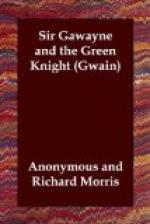[A] Bot Arthure wolde not ete
til al were serued,
He wat3 so Ioly of his Ioyfnes, & sum-quat
child gered,
His lif liked hym ly3t, he louied þe lasse
88 [B] Auþer to lenge lye, or to longe sitte,
So bi-sied him his 3onge blod & his brayn
wylde;
& also anoþer maner meued him eke,
Þat he þur3 nobelay had nomen, ho wolde neuer
ete
92 Vpon such a dere day, er hym deuised were
[C] Of sum auenturus þyng an vncouþe tale,
Of sum mayn meruayle, þat he my3t trawe,
Of[1] alderes, of armes, of oþer auenturus,
96 Oþer sum segg hym bi-so3t of sum siker kny3t,
To Ioyne wyth hym in iustyng in Ioparde to
lay,
Lede lif for lyf, leue vchon oþer,
As fortune wolde fulsun hom þe fayrer to
haue.
100 Þis wat3 [þe] kynges countenaunce where he
in court were,
At vch farand fest among his fre meny,
in halle;
[Fol. 92b.]
[D] Þer-fore of face so fere.
104 He sti3tle3 stif in stalle,
Ful 3ep in þat nw 3ere,
Much mirthe he mas with alle.
[Sidenote A: Arthur would not eat,] [Sidenote B: nor would he long sit] [Sidenote C: until he had witnessed a “wondrous adventure” of some kind.] [Sidenote D: He of face so bold makes much mirth with all.] [Footnote 1: Of of, in Ms.]
VI.
[A] Thus þer stondes in stale
þe stif kyng his-seluen,
108 Talkkande bifore þe hy3e table of trifles
ful hende
[B] There gode Gawan wat3 grayþed, Gwenore bisyde
[C] & Agrauayn a la dure mayn on þat oþer syde
sittes
Boþe þe kynges sister sunes, & ful siker
kni3tes;
112 [D] Bischop Bawdewyn abof bi-gine3 þe table,
[E] & Ywan, Vryn son, ette wit hym-seluen;
Þise were di3t on þe des, & derworþly serued,
& siþen mony siker segge at þe sidborde3.
116 [F] Þen þe first cors come with crakkyng of trumpes,
Wyth mony baner ful bry3t, þat þer-bi henged,
Nwe nakryn noyse with þe noble pipes,
Wylde werbles & wy3t wakned lote,
120 Þat mony hert ful hi3e hef at her towches;
[G] Dayntes dryuen þer-wyth of ful dere metes,
Foysoun of þe fresche, & on so fele disches,
Þat pine to fynde þe place þe peple bi-forne
124 For to sette þe syluener,[1] þat sere sewes
halden,
on clothe;
Iche lede as he loued hym-selue
Þer laght with-outen loþe,
128 [H] Ay two had disches twelue,
[I] Good ber, & bry3t wyn boþe.
[Sidenote A: The king talks with his knights.] [Sidenote B: Gawayne,] [Sidenote C: Agravayn,] [Sidenote D: Bishop Bawdewyn,] [Sidenote E: and Ywain sit on the dais.] [Sidenote F: The first course is served with cracking of trumpets.] [Sidenote G: It consisted of all dainties in season.] [Sidenote H: Each two had dishes twelve,] [Sidenote I: good beer and bright wine both.] [Footnote 1: svlueren (?) (dishes).]
VII.




